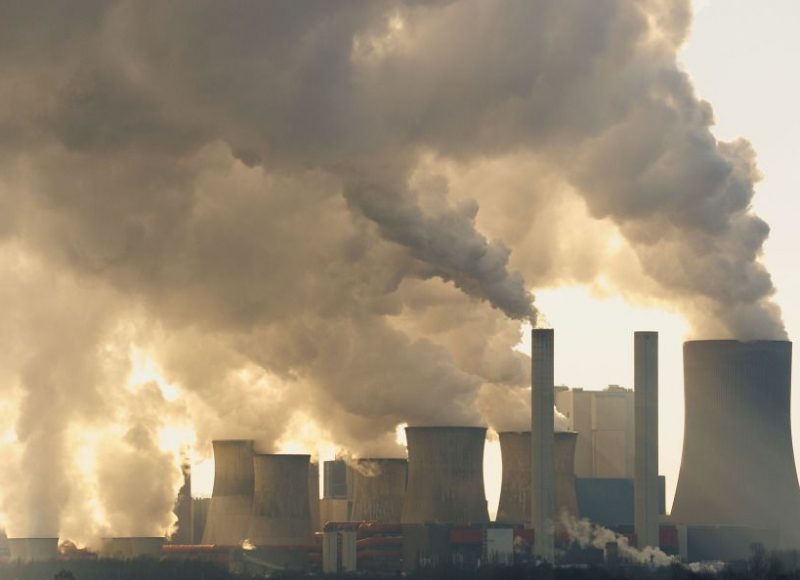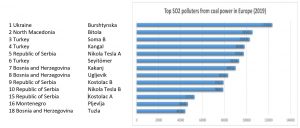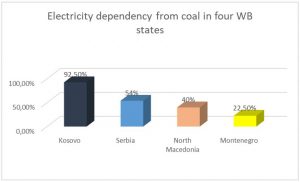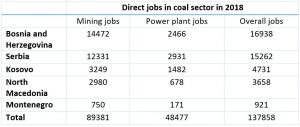
The social impact of air pollution in the Western Balkans
The social impact of air pollution in the Western Balkans
ÖGfE Policy Briefs
October 13, 2022
By Nikolaos Tzifakis & Dr. Anastasios Valvis
Policy Recommendations
The Western Balkans should:
- Ensure that as long as polluting sites remain operational, they will comply with EU environmental standards, decreasing their emissions.
- Adopt and operationalise with wide national consensus realistic and comprehensive decarbonisation strategies.
- Implement vigorously the regional energy connectivity agenda and pursue the establishment of transborder renewable resources energy networks.
- Launch campaigns to inform people about the need to reduce household energy consumption.
The European Union should:
- Push for genuine (rather than procedural) compliance with the EU acquis communautaire and use credibly accession conditionality.
Abstract
Environmental degradation is an alarming problem in the Western Balkans. Air pollution was the fourth greatest risk factor for human health globally in 2019. The European Union (EU) aspires to promote the transition to Renewable Energy Sources in the Western Balkans. However, this is not an easy task. Not only does it entail substantial socio-economic cost. It also requires overcoming the region’s structural deficiencies of governance and particularly the presence of unsustainable investments in the energy sector (predominantly by China), supported by the governments of Western Balkan countries. In this respect, this Policy Brief articulates recommendations in two directions. At the national level, Western Balkan countries should realise the benefits of energy transition for the local societies in terms of both health improvement and economic performance. At the EU level, policy-makers should increase their attention to the region’s deficient environmental policies, in addition to providing generous financial assistance to support transition. Amidst the war in Ukraine and its instantaneous implication in the Western Balkans’ energy security and economic recovery, the EU should be even more determined to prevent Western Balkan states from backsliding to old and unsustainable ‘energy production’ habits.
****************************
The social impact of air pollution in the Western Balkans
The social impact of air pollution
The environment is practically under siege in the Western Balkans (WB). The region faces severe challenges in complying with the Paris Agreement and European Union (EU) environmental standards. Paradoxically, despite falling short in economic development, the Western Balkan countries are the leaders in air pollution in Europe. According to some studies, air pollution is the fourth greatest risk factor for human health globally (Juginovic et al., 2021: 1). Human activities, such as energy consumption, transportation and heavy industry combustion lead to extensive air pollution with the levels of particulate matter (PM10 and PM2.5), Sulphur Dioxide (SO2) and other dangerous gases, frequently exceeding acceptable limits for human health (Hofthius et al., 2021: 1).
Paradoxically, despite falling short in economic development, the Western Balkan countries are the leaders in air pollution in Europe.
Air transmissible solid particles have a severe impact on human health, causing the appearance of acute and chronic diseases and early deaths (Kukolj, 2021: 4). According to medical studies, the intake of polluted air stands as the ninth most important risk factor leading to cardiopulmonary mortality (Kurt et al., 2016). Moreover, the International Agency for Research on Cancer (IARC) places air pollution among the greatest carcinogens for humans (Shahadin et al., 2018). As a result, air pollution causes annually around 3,000 premature deaths and 8,000 cases of bronchitis in children in the Western Balkans (Pujic, et al., 2019: 4). Equally severe is the impact of polluted air on the fertility rates of women.[1] It also poses a huge cost to the already weak healthcare systems and regional economies, estimated on an annual basis between 1.9 and 3.6 billion euro. According to the World Bank (2020: 4), the annual economic cost of air pollution ranged in 2020 from 3.6% to 8.2% of the annual gross domestic product (GDP) of Bosnia and Herzegovina, Kosovo and North Macedonia.
Air transmissible solid particles have a severe impact on human health, causing the appearance of acute and chronic diseases and early deaths.
In the Western Balkans, a major cause of air pollution is the fleet of outdated coal power plants. According to a study, 18 plants in the Western Balkans emit two and a half time more SO2 in comparison to 221 plants in EU countries.[2] Indeed, in 2019, 6 out of the 10 most SO2 polluting coal power sites in Europe were located in the region.[3]

Table 1: Data collected from EMBER (2021)
In the Western Balkans, a major cause of air pollution is the fleet of outdated coal power plants.
Bosnia and Herzegovina, Kosovo, North Macedonia, and Serbia failed to comply with their national emission reduction plans limits of air pollution during 2018-2019, exceeding by several times the ceilings for SO2 emissions from coal power plants (Ciuta, et al., 2021: 40). Western Balkan countries (with the notable exception of Albania) are heavily relying on “dirty coal” for their electricity in contrast to the EU where only the 9% of electricity came from lignite and another 9% from bituminous coal (World Bank, 2019: 20). In 2019, Western Balkan power plants emitted 10 times more CO2 than their correspondent in the EU-27 (Energy Community Secretariat, 2021: 5). The war in Ukraine might halt the transition to clean energy. Indeed, shutting down old coal power units seems to be postponed for a long time. In March 2022, despite the strong criticism by the Energy Community Secretariat, the parliament of Bosnia and Herzegovina decided to extend the operation of two coal power units until 2028. The prospect of importing electricity in quite high prices brings WB in front of a great challenge particularly as winter approaches (Morina, 2022).[4] Data indicate that several WB countries are characterised by a high degree of vulnerability to an increase in the price of electricity imports. For instance, Albania and North Macedonia rely heavily on imports to cover a significant share of their total electricity production, while even Kosovo where domestic electricity supply equals demand annually on average, yet during winter it usually faces a surge in demand (World Bank, 2022: 52). Amidst the current energy crisis, a potential backsliding of the WB states dependency on their domestic coal reserves instead of intensifying their energy transition shouldn’t be surprising.[5] Besides, it is quite worrying that Bosnia and Herzegovina, Kosovo and Serbia have not taken any steps towards the adoption of a realistic coal phase out strategy. So far, only North Macedonia and Montenegro have set a corresponding strategy, while, surprisingly, only Albania has already wiped out coal from the national electricity mix.[6] However, there is hope that the Trans Adriatic Pipeline (TAP) and the Interconnector Greece-Bulgaria (IGB), along with important investments on liquefied natural gas (LNG) terminals in Albania, Croatia and Greece could overturn these negative developments.
Amidst the current energy crisis, a potential backsliding of the WB states dependency on their domestic coal reserves instead of intensifying their energy transition shouldn’t be surprising.

Table 2: Data collected from the Energy Community Secretariat 2019
Western Balkans under transformation?
The Energy Community Secretariat recently reported (2021) that electricity production from fossil fuels increased in the Western Balkans by 4% in 2020. Investments in previous years in old-fashioned power plants have not only been damaging for the environment and human health, but also detrimental to the economic development of the region. The risk of these outdated energy infrastructures becoming stranded assets that must be closed down before being depreciated is very high (Voß, Weischer and Schön-Chanishvili, 2020: 2).
Crucially, dirty investments in the energy sector also have a questionable impact on economic development.
Another problem stemming from the region’s poorly maintained and dated energy infrastructure is its high energy intensity, i.e., the consumption of much energy for GDP production (Đurašković 2021: 482). According to Eurostat (2018), the energy intensity required for the production of EUR 1,000 of GDP in the Western Balkans was at least two times higher than the EU-27 countries, with estimations for Bosnia and Herzegovina, Kosovo and Serbia being even worse.[7] Crucially, dirty investments in the energy sector also have a questionable impact on economic development. As Pejović et al. (2021: 2775) put it, GDP growth “does not measure the degradation that the use of resources has on the environment”. Therefore, an increasing number of countries worldwide have been gradually integrating environmental concerns in their economic growth policies.
A glimpse of hope
In recent times, we have observed in the Western Balkans some small scale green investments and the establishment of a more environmental-friendly institutional framework. Although these trends should not be overstated, they could mark the beginning of a process of energy transition, with the EU guidance and support. Western Balkan countries have some potential to take advantage of renewable energy sources (RES). They have also all signed the Treaty establishing the Energy Community between the EU and neighbouring countries, acknowledging the need to increase the use of RES as a response to the projected increase of energy demand in the next 20 years (Đurašković et al., 2021: 484).
In recent times, we have observed in the Western Balkans some small scale green investments and the establishment of a more environmental-friendly institutional framework.
All countries in the region have increased the share of RES in their energy mix. For instance, Albania, which is the region’s frontrunner in RES, relies on hydropower for most of its electricity production.[8] Moreover, includes some quite promising projects for the future, such as the installation of a floating solar photovoltaic plant at the Vau Dejes reservoir in Albania (Bartlett et al., 2022: 23). Additionally, biomass is another important source for the region’s electricity systems. Nevertheless, although a positive trend emerges, RES keep representing only 6% of the total installed electricity generation capacity region-wide, showing the extent to which some countries lag behind (Đurašković et al., 2021: 483).
All countries in the region have increased the share of renewable energy sources in their energy mix.
The environmental dimension of EU accession
The EU adopted last year (24 February 2021) its new adaptation to climate change strategy aiming at becoming climate neutral by 2050. The European Green Deal, already presented in 2019, is essentially the roadmap to achieve this very ambitious goal and implement the UN Sustainable Development Goals Agenda (European Green Deal, 2019). The EU aspires to move towards a development model in which economic growth will rely on efficient use of resources (Knez et al., 2022: 2).
In November 2020, the leaders of the region signed the Sofia Declaration, committing themselves to conform with the EU climate targets and move towards EU accession.
However, the EU also needs to engage with its neighbouring countries since climate change and pollution do not stop at its external borders. The EU strives to motivate Western Balkan countries to follow a sustainable development path. In November 2020, the leaders of the region signed the Sofia Declaration, committing themselves to conform with the EU climate targets and move towards EU accession. On its turn, the EU devised an Economic and Investment Plan to support the region’s Green Agenda. It concerns an investment package amounting to 9 billion euro, that aspires, through the Western Balkans Guarantee Facility, to additionally pull investments of up to 20 billion euro within the next 10 years. Transition from coal is one of the flagship projects included in the Economic and Investment Plan. Through various gas-interconnector projects (like the gas-interconnector that would link Bosnia and Herzegovina to Croatia, or the linkage of Kosovo to North Macedonia towards the North Macedonia-Greece interconnector), and most importantly via the Trans-Balkan Electricity Transmission Corridor in Serbia, the EU envisions to bring an end to the use of dirty coal and boost the transition towards green energy sources (Bartlett et al, 2022: 27).
On its turn, the EU devised an Economic and Investment Plan to support the region’s Green Agenda.
The challenge of energy transition for Western Balkan economies is very high. In Serbia, for instance, Electrical Power Industry (EPS) is one of the country’s largest employers, having 20,236 people in its payroll at the end of 2021.[9] Moreover, as the following table demonstrates, the regional job market’s dependency on the coal sector is non-negligible. Hence, the EU support is crucial to attain a transition that does not cause massive job losses and rise of unemployment.

Table 3: Job market’s dependency from the coal sector[10]
The European Commission has raised doubts itself about the effectiveness of its the financial assistance provided for the region’s environmental transition. According to its own assessment, financial assistance prior to the Green Agenda “has been mainly sectoral, focused on the process of alignment to the EU acquis communautaire under the requirements of chapter 27, with both actions at bilateral (mainly investments) and regional level (mainly capacity building)” (European Commission, 2020: 20). In this respect, the Green Agenda’s all-inclusiveness aims at extending the focus towards a broader sustainable economic development prospect.
Western Balkan countries face structural problems related to governance that could hold off green investments.
In February 2022, the European Commission launched a 3.2 billion euro investment package to support sustainable development in the Western Balkans in the framework of the EU’s Economic and Investment Plan for the region.[11] Yet, it is hard to tell whether the fund linked to the Green Agenda is sufficient. Western Balkan countries face structural problems related to governance that could hold off green investments. Moreover, governments in the region don’t seem to be quite eager to promote and enforce the prescribed policies. The belated submission by Serbia, Montenegro and Bosnia and Herzegovina of their National Energy and Climate Plans (NECPs)[12] gives the impression that they treat the environment as a secondary priority. Besides, Bosnia and Herzegovina and Serbia have been attracting investments with negative environmental footprint from China despite the warnings by the EU and civil society organisations.[13]
Considering the weakness of rule of law in the region, a further cause of concern is the possibility that the European Green Agenda becomes another object for corruption and mismanagement. EU funds should not end up financing state-owned enterprises from foreign investors that do not support the region’s green transition. Besides, the EU Green Agenda lacks specific enforcement mechanisms to secure compliance with the pre-defined terms, relying on the commitment of recipient countries to energy transition and EU accession. In this regard, the EU decision of December 2021 to open accession negotiations with Serbia on Cluster four, while the country was shaken by environmental protests sent a confusing message to the entire region and discredited the civil society’s demand for greater environmental protection. Admittedly, Belgrade is constantly ranked among the most polluted capitals in the world, while there are important gaps in Serbia’s efforts to meet RES targets.
Conclusions and policy recommendations
In the Western Balkans, the socio-economic cost of air pollution due to dirty energy production is significant. Although the European Green Deal is a much-needed instrument in the efforts to promote energy transition in the region, it is still too early to tell whether its funds would suffice to stimulate and bring about sustainable change. Moreover, to move towards a greener model of development, there is a pressing need to overcome structural deficiencies in the region such as regulatory ambiguity, lack of transparency, and low prioritisation of the environment. If that does not happen, the Western Balkans will be entrapped in a vicious circle of underdevelopment that would further encumber the improvement of the people’s living conditions and social welfare in the region.
The war in Ukraine and its implications in the energy sector are yet to be seen in a full scale. The decision of EU member states to retrocede regarding coal-fired power plants closure to prevent a collapse in the energy system, is something that empowers WB leaders’ decision to keep using coal and even reconstruct old facilities like in Kosovo.[14] Indeed, transition towards green energy has not been abandoned from the WB states, quite the contrary. However, real-time needs urge them to reconsider abandoning investments on coal fired facilities. Interconnectedness through other gas supply networks (like the TAP and the IGB) or even the construction of LNG facilities like those in Albania, although not providing instantaneous solutions, they could provide assurances to WB governments in the near future.
To this end, the Western Balkans should:
- Advance their regulatory framework on the environment and seek to attract investors eager to invest on renewable energy sources.
- Consider the health impact of air pollution in policy-making decisions.
- Constantly monitor levels of air pollution and take urgent measures whenever it exceeds alarming levels to safeguard public health.
- Ensure that as long as polluting sites remain operational, they will comply with the EU environmental standards, decreasing their emissions.
- Adopt (precisely, the three countries that have failed to do so, i.e., Bosnia and Herzegovina, Kosovo and Serbia) and operationalise with wide national consensus realistic and comprehensive decarbonisation strategies.
- Construct new gas pipelines to be ‘hydrogen ready’ in order to comply with EU suggestions.
- Implement vigorously the regional energy connectivity agenda and pursue the establishment of transborder renewable resources energy networks.
- Launch campaigns to inform people about the need to reduce household energy consumption.
The EU should:
- Support the generation of new employment opportunities through reskilling programs for employees in coal power plants and in brown industries.
- Push for genuine (rather than procedural) compliance with the EU acquis communautaire and use credibly accession conditionality.
- Link part of EU financial assistance with progress in environmental reforms.
- Secure a more adequate coordination among donors to increase the effectiveness of EU assistance in the region.
- Intensify investments on RES and reduce emphasis on investments in gas pipelines for the transition from coal.
